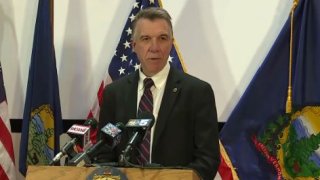
Camping will look different this year under Vermont's state park restrictions, announced by Gov. Phil Scott Monday, alongside a teaser of a "major economic package," to come later this week.
"I know this has been incredibly difficult for everyone and in some ways the restart process is even more challenging than the closings were," Scott said in a Monday press conference. "Everything we’ve done has suppressed this virus. If we stay vigilant, we can continue down the road to recovery."
Scott will announce the "major economic package," Wednesday, he said, which will, "provide relief, hope and initiatives to get us moving towards recovery." Parts of that package will address the pandemic's impact on the tourism industry, Scott said Monday.
Both residents and non-residents alike will need to quarantine in Vermont for 14 days prior to visiting a state park. Out-of-state visitors are still being asked not to come to Vermont for recreational activities, or if they do, to self-quarantine for at least two weeks before engaging in any activities.
Camping will not be offered at least through June 25. All reservations prior to that date will be canceled and refunds will be issued automatically in the form of gift certificates.
Measures will be taken to reduce common touch-points on campgrounds, including the removal of park benches, tables and chairs as well as the disconnection of water fountains. Spigots will still be available for use.
Campers will be asked to maintain physical distance, wear masks, bring sanitizing products and cancel trips if they feel sick. More information on the state parks can be found on the state's website.
Scott doubled down on his indication that he’ll soon be allowing outdoor dining and certain services like hair salons to reopen by June 1, if all the health department numbers continue looking good. He said he will have more clarity on that step Wednesday.
"We still have a long way to go, but we know what trends and metrics to watch," Scott said. "We know the virus isn’t going to disappear. Outbreaks are going to be a concern in the months ahead."
As of Monday, Vermont had 940 total coronavirus cases, 815 estimated recoveries and 54 deaths. Despite encouraging metrics in Vermont, Scott said he continues to watch the spread in other states.
"We know we can't only look at Vermont's numbers, which is why I feel it's necessary to move a little more cautiously than our numbers would suggest," Scott said. "I know this is causing frustration for some, but remember, the virus knows no borders."
Another reason for the slow, cautious expansion, Scott has said, is that he doesn’t want to change Vermont’s lowest-in-the-nation three-day coronavirus growth rates.
Scott's Monday update comes as a new round of businesses prepare to reopen in Vermont starting Memorial Day weekend. Vermont inns, hotels, short-term rentals, campgrounds and marinas can start hosting overnight reservations again as of Friday, May 22 with restrictions, Scott said Friday.
The next phase in Scott's reopening plan came after an extension of the state of emergency declaration until June 15.
Bookings will be limited exclusively to Vermont residents at first, as well as people who swear on an official form they’ve met the governor’s 14-day in-state quarantine requirement.
Early bookings must be kept to 25% capacity in most cases, Commerce Secretary Lindsay Kurrle said Friday.
Under the new rules, Kurrle explained, food service at lodging sites can only be takeout or delivery, groups of 10 or larger aren’t allowed and businesses have to keep a 30-day log of guests, so if any disease outbreaks happen, the state can track folks down.

